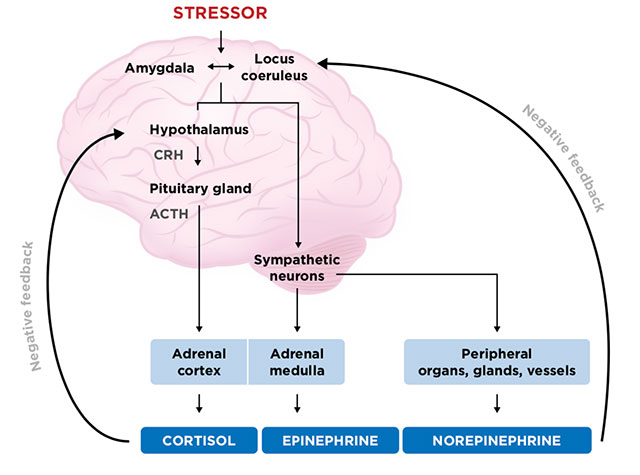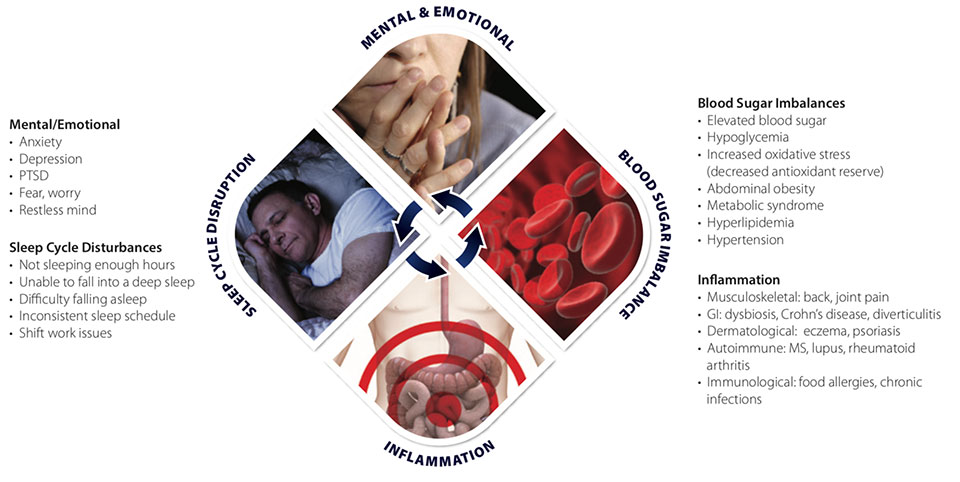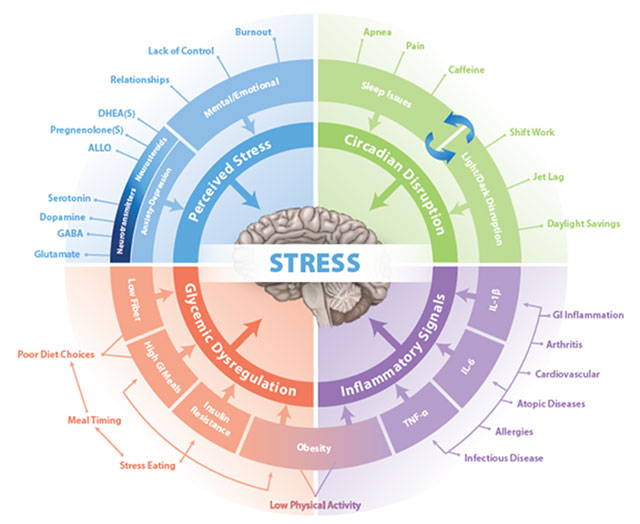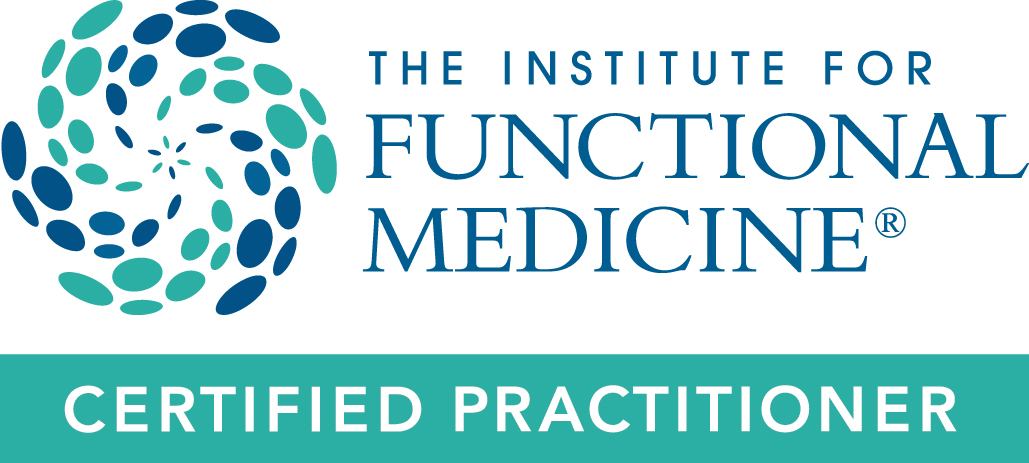Is Chronic Stress Affecting Your Health?
Everyone experiences stress at one time or another, but chronic high stress, and how that stress is perceived, can be detrimental to your physical and mental health. It can instigate feelings of anxiety and overwhelming fear. It can also weaken your immune system and overall health, leaving you susceptible to colds and flu, an increase in aches and pains, as well as many serious illnesses.
How We Help Our Clients Overcome Chronic Digestive Distress
Chronic stress silently deteriorates many aspects of your health, including hormone imbalances and modifications to the structure and function of your brain. These changes make it more challenging to cope with daily stress, decrease concentration and memory, and eventually will lead to a mental or brain fog.
Amazingly, the effects of stress often go unnoticed until the accumulation manifests as mental or physical exhaustion or burnout. Due to the overall compromised health and chronic disease stress causes, it has often been referred to as “The Silent Killer.”
Here are examples of symptoms and conditions that can result from chronic stress:
- Decreased concentration
- Mental or brain fog
- Constipation/Diarrhea
- Decreased memory capacity
- Insomnia
- Depression
- Anxiety
- Fatigue
- Muscle or back pain
- Blood sugar dysregulation
- High blood pressure
- Headaches or migraines
- Hormonal and thyroid imbalances
- Weight gain
- Addiction (smoking, alcohol or drug abuse)
- GI conditions such as irritable bowel syndrome
- Frequent infections (such as cold or flu)
- Accelerated aging

What Is Stress? What Are The 4 Key Stressors?
Initiation of the stress response begins within the brain and activates release of a series of hormones. The stress response system includes the hypothalamic-pituitary-adrenal (HPA) axis and the sympathetic nervous system (SNS).
The HPA axis and the SNS regulate your body’s fight-or-flight response, which is important for preparing the body to quickly respond to immediate danger, such as avoiding a car accident. The result of HPA and SNS activation is a heightened sense of awareness, an accelerated heart rate and rapid breathing.
Cortisol is the primary hormone involved in regulating the stress response. The adrenal glands secrete cortisol, along with the fight-or-flight hormone epinephrine (also known as adrenaline). These hormones travel through the bloodstream preparing the body for a quick response to potential danger.
In addition to heightened awareness, you will experience an increase in blood sugar and blood pressure, as well as decreased immune defense, decreased digestion and a breakdown in muscle. Once the stressor is removed, this state of “sympathetic nervous system dominance” will subside and your body will return to a normal relaxed state.
It is natural for the body to respond to occasional “acute” activation of the HPA axis and sympathetic nervous system. However, chronic stress resulting from living a stressful life is not what the body was built to withstand. If the stressor(s) are not removed, or ongoing stress accumulates, the hormones will cause damage to the body by depleting the body’s resources and shifting into a state of catabolism, or breakdown.


The 4 Key Stressors
When most people think of stress, they usually limit their definition to mental and emotional stressors. Changing jobs or losing a loved one, for example, can send your stress (and cortisol) levels soaring.
However, events like blood sugar imbalances, inadequate sleep and inflammation, are also potent stimulators of cortisol production within the HPA axis. The result is an activation of the stress response system.
One of the most common and easiest stressors to control, is imbalanced blood sugar.
Skipping breakfast after fasting overnight, causes your blood sugar levels to drop. Your body attempts to restore balance by increasing cortisol levels which will restore blood sugar to normal. There are no major consequences if this is an occasional occurrence, however, ongoing blood sugar fluctuations controlled by hormones can become a problem.
If blood sugar remains an issue, coupled with inflammation in the body, poor sleep patterns, and then topped with mental and emotional stress, you have created a recipe for disaster. It is critical to identify the major stressors in your life so you may develop a plan to overcome stress before it becomes a pathway to chronic disease.
Introducing The SOS Stress Recovery Program
The SOS Stress Recovery Program is a nutrition and lifestyle program designed to help bring the mind and body back into balance while eliminating the unhealthy effects of stress.
Each person’s response to stress is unique and complex. The essential tools in this program are designed to be flexible as they help support each component of the stress response, allowing you to find the perfect balance that restores your vitality and optimal health.
Throughout the program, you will better understand how stress affects your health on a daily basis – including why your body responds, or fails to respond, to the stressful events in your life.
Starting with the “Life Event Stress Inventory,” you will discover the life events that may be the most stressful. Additionally, the program outlines recommendations for the four major factors that trigger a stress response in the body: mental and emotional stress, blood sugar imbalances, insomnia and inflammation.
Once you understand these basic principles, you will have the tools to control your stress response, rather than be controlled by the events and circumstances around you.

Frequently Asked Questions
Functional medicine is a science-based, individualized approach to health that goes beyond traditional medicine. It finds the root cause of illness by focusing on gut health, metabolism, hormones, environment, and genetics. A personalized diet, nutritional supplementation, and lifestyle plan is designed for your unique profile to achieve health. The Institute for Functional Medicine’s website (ifm.org) has detailed information regarding our practice model.
Both functional and holistic medicine focus on the total body. Functional medicine focuses on interactions between genetics, environment, and lifestyle that impact health. Holistic medicine has a spiritual approach to the body, mind, and soul.
Functional medicine can help with many health problems, such as fatigue, sleep problems, indigestion, weight gain, and hormonal imbalances. If you’re on multiple medications, want to get to the root of your symptoms, or want more natural ways to optimize your health, functional medicine can help you.
As a board-certified internist, I am experienced with chronic diseases such as hypertension, diabetes, cardiac, inflammatory, gastrointestinal, and autoimmune diseases. I also treat fatigue, weight gain, hormone imbalances, and gut dysfunction, such as bloating and gas.
Absolutely! In addition to treating illness, functional medicine also emphasizes prevention for health maintenance.
No, I am not a primary care provider. I will work with you as a functional medicine consultant to address the cause of your chronic health problems and discuss them with your primary care provider if necessary.
Dr. Shimizu is licensed to practice Internal Medicine (adult medicine) in the state of Hawaii.
Yes, when necessary.
I review the traditional labs obtained by your primary provider, such as cholesterol levels and blood counts. Depending on your health goals, I recommend further testing. Some examples are specialized metabolic tests, gut health, environmental toxins, or food sensitivity tests. Some of these specialized testing are not covered by insurance and are out-of-pocket.
Functional medicine is considered complementary alternative medicine; not all insurance plans cover this service. You will pay at the time of your visit, and I will provide a superbill for you if you wish to submit the claim to your insurance or apply to your flexible spending accounts (FSA). We currently accept traditional Medicare.
Rates: – Initial visit (60 minutes): $300 – Second visit (45 minutes): $225 – Follow-up visits (20 minutes): $100 – Initial Visit Package (first three visits included): $700
Go to Olena Center’s online scheduler to schedule an initial appointment. (make this a click here) You will complete health questionnaires and upload available medical records before your appointment. During the first visit, you and I will discuss your health history, family history, diet, and lifestyle habits. I will review different approaches to your health and make some suggestions for change at this time. I may also recommend laboratory testing. The second visit is generally 1-2 months later. At this time, I will evaluate your progress and further personalize your care plan. I may recommend additional dietary changes, supplements, lifestyle changes, and possibly medications. The timing for additional follow-up visits will depend on your customized plan.





